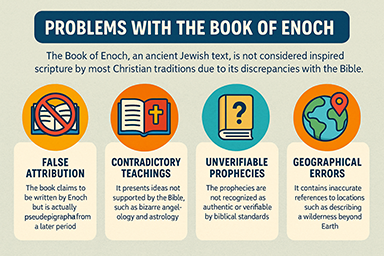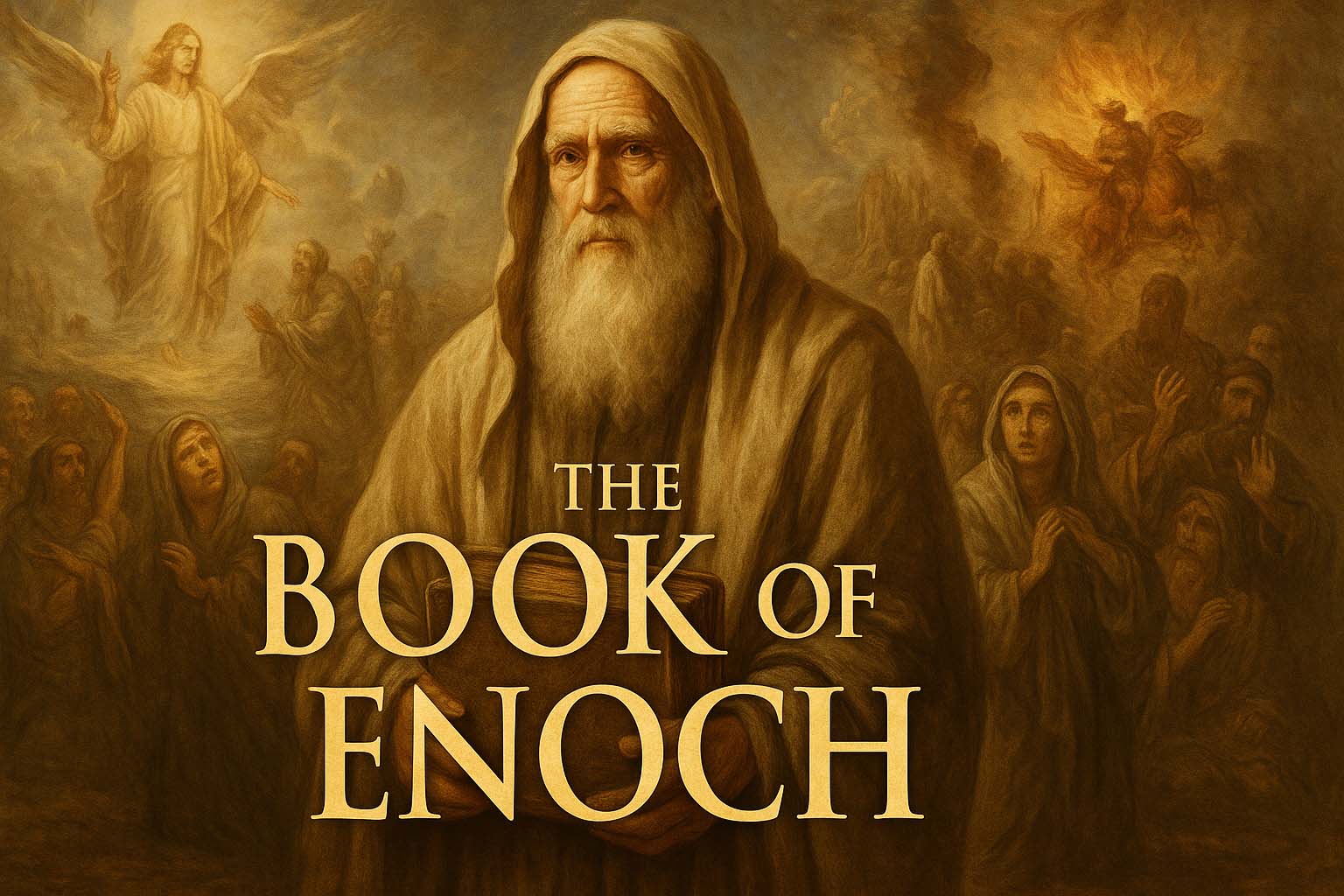Article
Search Articles
Listen
Download Article Summary
Grab a quick summmary to review the highlights of this article.
Download SummaryRelated Articles
Get The Infographic
Get the full sized infopgraphic overview highlighting the key points discussed in this article.
Download Now
The Book of Enoch: An Inspired Book or Not?
 Loading author...
Loading author...

The Book of Enoch is a fascinating and controversial text that has sparked
debate among scholars, theologians, and believers for centuries.
It’s an
ancient Jewish writing attributed to Enoch, the great-grandfather of Noah,
and it contains vivid accounts of angels, cosmic visions, and prophecies.
While some view it as a valuable historical or spiritual document, others
question its authenticity, inspiration, and compatibility with the Bible.
In this article, we’ll dive into the key issues surrounding the Book of Enoch,
exploring why it’s not considered inspired by most Christians, its contradictions
with the Bible, and whether it should be treated as the Word of God.
We’ll keep
things clear and straightforward, aiming to unpack the real problems with this
text in a way anyone can understand.
What Is the Book of Enoch?
The Book of Enoch, also called 1 Enoch to distinguish it from later texts like 2 Enoch and 3 Enoch, is a collection of writings that likely dates to between the 3rd and 1st centuries BCE. It’s part of a category of texts known as pseudepigrapha—writings falsely attributed to a biblical figure. The book is divided into several sections, including:
- The Book of the Watchers: Describes fallen angels who marry human women and produce giant offspring called Nephilim.
- The Book of Parables: Focuses on visions of the Messiah and the judgment of the wicked.
- The Astronomical Book: Details Enoch’s visions of celestial mechanics and calendars.
- The Book of Dream Visions: Recounts allegorical visions of history.
- The Epistle of Enoch: Offers moral teachings and warnings about the end times.
While the Book of Enoch was influential in some early Jewish and Christian communities, it’s not included in the canon of most modern Bibles, except in the Ethiopian Orthodox Church, where it’s considered sacred. This raises the question: why isn’t it widely accepted, and what problems does it pose?
Is the Book of Enoch Inspired?
For a text to be considered inspired—meaning it’s divinely authored and carries the authority of God’s Word—most Christian traditions require it to meet certain criteria. These include apostolic authorship or endorsement, widespread acceptance by early churches, and consistency with established scripture. Let’s see how the Book of Enoch measures up.
Arguments Against Inspiration
- Uncertain Authorship: The Book of Enoch claims to be written by Enoch, a f igure from Genesis who “walked with God, and he was not, for God took him” (Genesis 5:24). However, scholars widely agree that the text was written centuries after Enoch’s time, likely by multiple authors between 300 BCE and 100 CE. This pseudonymous authorship undermines claims of divine inspiration, as it’s not directly tied to a prophet or apostle.
- Limited Acceptance in Early Christianity: While some early Christians, like the writer of Jude (who quotes Enoch in Jude 1:14–15), referenced the Book of Enoch, it was never universally accepted. Major church councils, like those that shaped the New Testament canon, excluded it. Early church fathers like Augustine and Jerome rejected it, citing concerns about its authenticity and theological content.
- Historical and Cultural Context: The Book of Enoch reflects ideas from Second Temple Judaism, a period of diverse Jewish thought influenced by Hellenistic culture. Its focus on angels, cosmology, and apocalyptic themes aligns more with intertestamental literature than with the prophetic writings of the Old Testament. This suggests it’s a product of its time rather than a timeless revelation from God.
Arguments for Inspiration
Some proponents argue that the Book of Enoch should be considered inspired for several reasons. They often cite its historical significance, its influence on early Christian thought, and its unique insights into biblical themes. However, these arguments are generally Some groups, like the Ethiopian Orthodox Church, argue that the Book of Enoch is inspired because:
- It was preserved in their biblical canon, suggesting divine protection.
- It’s quoted in Jude, which could imply apostolic approval.
- It provides detailed explanations of events like the fall of angels, which some find complementary to Genesis.
However, these arguments are weak against the broader evidence. The quote in Jude doesn’t mean the entire book is inspired, just as Paul quoting Greek poets (Acts 17:28) doesn’t endorse their works as scripture. The Ethiopian Church’s inclusion is an exception, not the norm, and may reflect unique historical factors rather than universal truth.
Conclusion on Inspiration
In summary, the Book of Enoch fails to meet the criteria for divine inspiration accepted by most Christian traditions. Its uncertain authorship, limited acceptance in early Christianity, and cultural context suggest it’s a human composition rather than the Word of God. While it may offer historical or spiritual insights, it lacks the authority of canonical scripture.
Contradictions with the Bible
One of the biggest issues with the Book of Enoch is its apparent contradictions with the Bible. If a text is inspired, it should align with the rest of scripture, which Christians believe is cohesive and divinely consistent. Let’s examine some specific areas where the Book of Enoch diverges from biblical teaching.
1. The Nature of Angels and the Nephilim
The Book of Enoch expands on Genesis 6:1–4, where the “sons of God” marry the
“daughters of men” and produce offspring. Enoch identifies these sons of
God as fallen angels (called Watchers) who sin by marrying humans and
teaching forbidden knowledge, like magic and metallurgy. Their offspring,
the Nephilim, are described as giants who wreak havoc on earth.
Contradiction: The Bible doesn’t explicitly say the
sons of God are angels. Some scholars interpret them as human kings
or godly men from Seth’s line, not spiritual beings.
The Bible also
doesn’t depict angels as capable of marrying or reproducing, as Jesus
says angels “neither marry nor are given in marriage” (Matthew 22:30).
Enoch’s detailed narrative about angels’ physical interactions with
humans adds speculative elements not supported by scripture.
2. Cosmology and Angelic Roles
The Book of Enoch presents a complex cosmology with multiple heavens,
angelic hierarchies, and detailed descriptions of celestial beings.
It describes Enoch’s journeys through these heavens, where he
encounters various angels and learns about the workings of the universe.
Contradiction: The Bible is sparse on cosmological details and doesn’t assign angels such elaborate roles. For example, Psalm 104:4 describes angels as God’s messengers, not celestial bureaucrats. The Bible also doesn’t endorse a specific calendar, and Enoch’s solar calendar contradicts the lunar-based festivals in Leviticus 23. These additions feel more like speculative mythology than biblical revelation.
3. Salvation and Judgment
The Book of Enoch emphasizes apocalyptic judgment, with vivid descriptions of the wicked being punished and the righteous rewarded. While this aligns broadly with biblical themes, Enoch introduces ideas like angels binding demons in specific locations (e.g., the abyss) and a preexistent Messiah figure called the “Son of Man.”
Contradiction: The New Testament presents Jesus as the unique Son of Man, revealed progressively through his life and ministry (Mark 8:31). Enoch’s portrayal of a cosmic Messiah figure predating Jesus could confuse the biblical narrative of Christ’s incarnation. Additionally, the Bible reserves ultimate judgment to God (Revelation 20:11–15), not angels, as Enoch suggests.
4. Theological Tone and Focus
Enoch’s tone is heavily apocalyptic and speculative, focusing on secret knowledge and cosmic mysteries. This contrasts with the Bible’s emphasis on God’s covenant with Israel, moral obedience, and faith in Christ.
Contradiction: The Bible warns against being consumed by “myths and endless genealogies” (1 Timothy 1:4) or seeking hidden knowledge beyond what God reveals (Deuteronomy 29:29). Enoch’s speculative details about angels, heavens, and forbidden knowledge can distract from the Bible’s focus on God’s redemptive plan.
Summary of Contradictions
While the Book of Enoch shares some themes with the Bible, its additions and divergences—especially regarding angels, cosmology, and judgment—create tensions with canonical scripture. These differences suggest it’s not a reliable extension of God’s Word but rather a distinct work shaped by its historical and cultural context.
Real Problems with the Book of Enoch
To sum up, the Book of Enoch poses several significant problems:
1. Questionable Authenticity: Its pseudonymous authorship and late composition undermine claims of divine origin.
2. Theological Inconsistencies: Contradictions with the Bible on angels, cosmology, and judgment create confusion and conflict with scripture.
3. Speculative Nature: Its focus on secret knowledge and elaborate myths risks distracting from the Bible’s clear message of salvation.
4. Limited Authority: Its rejection by most Jewish and Christian traditions reflects its lack of universal acceptance as God’s Word.
These issues don’t mean the Book of Enoch is worthless—it’s a valuable window into ancient Jewish thought. But elevating it to the level of scripture ignores its historical limitations and theological flaws.
Tags: